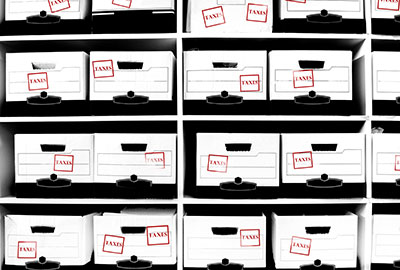Once Your Taxes are Filed, Store Your Documents in a Self Storage Unit
We all dread tax season. Even if you’re lucky enough to get a refund, the process of gathering all the necessary documents and filing the paperwork is a chore. Once you’ve filed, what do you do with all that paperwork? Properly storing your tax documents may prevent headaches later.
Unlike a utility bill or other document that can be shredded once it’s been paid or dealt with, tax documents need to be kept for several years. According to the IRS, the amount of time you need to hang onto your tax documents depends on the action, expense, or event impacting those records. You need to keep your documents for the time frame during which the IRS can audit a return or you are allowed to file an amended return. Depending on the complexity of your tax returns, the IRS recommends that you save your federal tax returns for up to seven years. In addition to the tax forms, you must keep all related documentation, including W2s, 1099s, and any documents related to itemized deductions. You should also keep investment forms, such as IRA account documents, for at least seven years. Bank statements and paystubs, on the other hand, only need to be kept for two years. Property records and other similar documents should be kept indefinitely.
Storing several years’ worth of tax paperwork and related documents takes up valuable storage space in your home. While you need to keep it, you don’t need access to it regularly, which makes it ideal for storing in a self storage unit. Storing your tax documents in self storage will free up space in your home office, making it less cluttered and easier to keep organized. In addition to tax documents, self storage is a great solution for storing other types of documents that you need to keep long-term but rarely need to access. When choosing a self storage unit, be sure to select one that is climate controlled, which will help prevent your documents from breaking down or becoming discolored. AAA Self Storage of Lansing offers climate controlled units in a variety of sizes.
As with anything you place into your self storage unit, taking the time to ensure it is properly organized first will make it faster and easier to find what you need when you need it. Start out by establishing a logical organizational scheme. For example, tax documents should be organized by year. Other types of documents should be sorted by type and then organized by year. Put your documents into folders that are clearly labeled. It is imperative that you select storage containers that will protect your documents. Good choices include filing cabinets, banker’s boxes, or other small containers. Opt for a container that is moisture resistant. Be sure to label the outside of each box with the contents, date, and other relevant information so you can find it quickly.
When storing your boxes in your storage unit, avoid stacking the boxes too high and be sure to leave a path so that the boxes can be accessed easily. Place boxes with any documents you anticipating needing on top and at the front of your storage unit. It’s also a good idea to keep a list at home that details which documents are stored in your storage unit.

